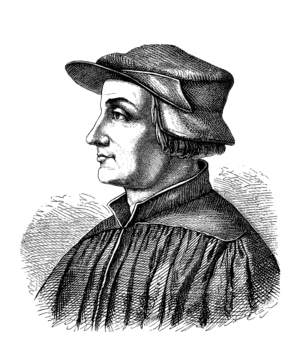
Ulrich Zwingli
1484–1531
The Swiss Giant
By Travis Myers
Ulrich Zwingli’s career as a Reformer was relatively brief, but his energetic and multifaceted leadership was crucial in the early days of the Protestant movement.
Born to the chief local magistrate of a small alpine village named Wildhaus in 1484, Zwingli attended the universities of Vienna and Basel before serving as priest in the Swiss town of Glarus from 1506 to 1516. While priest in the town of Einsiedeln the following two years (1517–1518), Zwingli broke with traditional Roman Catholic practice by preaching in clear expository fashion in the German vernacular of his people. Such preaching earned him a post in the free city or “canton” of Zurich by 1519.

In Einsiedeln, Zwingli had been an ardent student of the Greek New Testament recently compiled by Erasmus of Rotterdam. Now in Zurich, Zwingli spent six years preaching straight through the New Testament, mingling with the people of his parish, writing against unscriptural Catholic dogma and practices, and engaging in public debates with Catholic authorities before the town leaders. During that time, the town councils of both Zurich and the nearby canton of Bern voted to adopt Protestantism.
The Sixty-Seven Articles
For his public debates with Catholic authorities in early 1523, Zwingli composed “The Sixty-Seven Articles.” The document’s brief introduction and conclusion reveal Zwingli’s deep respect for the authority of God’s word and his firm belief in the Bible’s unique status as the only revelation of the saving good news of Jesus Christ and of God’s will for Christian people. The introduction reads,
The articles and opinions below, I, Ulrich Zwingli, confess to have preached in the worthy city of Zurich as based upon the Scriptures which are called inspired of God . . . and where I have not now correctly understood said Scriptures I shall allow myself to be taught better, but only from said Scriptures.
Zwingli would expand on these articles in a book-length treatise in 1525 titled “The True and False Religion.” In 1526, he composed “Ten Theses” for Bern, which served as a succinct summary of his Reformed perspective.
Away with the Pomp
Zwingli, the Swiss giant of the Reformation, was particularly indignant about the pomp, hypocrisy, and idolatry of man-made religion. His labors for the reformation of Zurich and other Swiss cantons can be best conceived of, perhaps, as an effort to free people from the burdens imposed by a religious system invented by men that can’t deliver on its promise of eternal life.
Article 7 of “The Sixty-Seven Articles” states that Christ “is an eternal salvation and head of all believers, who are his body, but which is dead and can do nothing without him.” Attending Mass, participating in the so-called sacraments of Roman Catholicism, or even being ordained as a priest did not make someone a spiritually alive member of the true “ecclesia catholica” (universal church). That only happens by the gospel and the Spirit.
Eat a Sausage, Find a Wife
Zwingli was an activist who not only aimed to teach and apply the Bible alone, but who lobbied both church and civil authorities to realign their laws and policies with God’s word. During the Lenten season of 1522, Zwingli gave his tacit assent in the home of a parishioner, the printer Christoph Froschauer, as he and his guests ate sausage, prohibited by the Roman Catholic Church during Lent but a staple local food. Zwingli successfully lobbied the Zurich town authorities to release these men from jail, where they’d been put for breaking the Lenten fast.
Taking advantage of the town council’s leniency, Zwingli and ten other priests wrote to the Bishop of Constance requesting the right of priests to be married, since the blanket requirement of clerical celibacy was unscriptural and unwise. Zwingli himself was already living with a widow, Anna Reinhart, whom he married soon after Zurich became a Protestant canton free from the bishop’s authority.
Zwingli also held a deep respect for women and longed for them to experience authentic Christian discipleship. In 1522, he visited a convent to deliver a series of lectures titled “Of the Clarity and Certainty of the Word of God,” theological lessons on the doctrine of revelation and Bible interpretation.
Twelve Years of Reform
On October 11, 1531, at age 47, Zwingli died unarmed on a battlefield near Kappel, Switzerland, serving as a chaplain to the Protestant troops, carrying only a flag and a Bible.
At the time of his death, Zwingli was only a dozen years removed from his life as a priest in Einsiedeln — a short career compared to Luther’s and Calvin’s decades of reform. But there’s a reason Zwingli is often the third name people mention when remembering the Reformation. By God’s grace, this dynamic Reformer’s dozen years brought countless Swiss men and women away from dead ceremony, and back to Jesus Christ.
Heinrich Bullinger succeeded Zwingli as pastor of Gross Münster church and head of Zurich’s “School of the Prophets,” which trained men in biblical languages, exegesis, and preaching. In the 1560s, Bullinger was the main author of the Second Helvetic Confession, adopted soon after by Reformed churches in Switzerland, Scotland, Hungary, France, and Poland. It remains to this day one of the most influential and beloved doctrinal statements of various Reformed denominations the world over.
Recent Comments